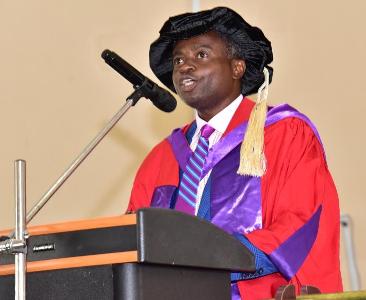A Professor of Nuclear Radiation and Medical Physics with the Federal University of Technology Akure (FUTA), Prof. Adeseye Arogunjo has stated that radiation that emanate from power lines, home wiring, airport and military radar, sub stations, transformers, computers, cell phones and domestic appliances are major causes of leukemia, brain tumors, miscarriages, chronic fatigue, headaches, cataracts, stress, nausea, sleep disturbance and other health and dermatological problems.
He stated this while making a presentation titled: “Nuclear Radiation Paradox and Phobia: Public Health Nexus in a phlegmatic populace” at the 106th Inaugural lecture of the University, Tuesday.
According to Arogunjo, “non-thermal low intensity radiations are becoming a public health concern due to the installation of antenna on masts and buildings, to facilitate the widespread use of mobile phones and digital satellite receiver radio propagation.”
He added that certain elements in radiation could be inhaled or absorbed through the bloodstream with devastating consequences as the smallest dose of radiation and has the potential to cause harm to human health.
The Don identified some of the harmful effects of radiation to range from loss of appetite, mild fatigue while malaise and acute fatigue, nausea sweating, fever apathy and low blood pressure and other major ailments result in prolonged and acute exposure to radiation.
Arogunjo warned that Nigeria should thread the path of generation of power from nuclear sources with caution because of the near absence of the required safety procedure coupled with appropriate legal legislation.
The lecturer, who currently serves as Deputy Vice Chancellor, Academics at the University of Medical Sciences, Ondo said developed nations have engaged in several funded research efforts that had brought about notable discoveries.
This, he stressed had led to better understanding of the effects of nuclear radiation and this has led to the development of a system of radiological protection for people exposed to sources of radiation.
“While organized societies galvanize efforts towards creating proactive measures to protect people from the odious effects of radiation, Nigeria on the hand is a phlegmatic society, with its people possessing a stoic ability to bear hardship and adversity with fortitude and not easily excited to action and this has made the country adverse to proactive measures in this regard,” Arogunjo stated.
According to him, the Nigerian situation was compounded because the appropriate framework needed to guarantee an organized platform for setting regulations and standards for necessary interventions through systems of radiological protection was practically inaccessible.
Explaining the health and medical benefits of radiation for diagnostic and therapeutic purposes, the Don said that “most modern procedures used in many hospitals involve radiations that are useful in broad fields of medical specialties ranging from pediatrics, internal medicine, obstetrics and gynecology, surgery and in most recent times, is the Computed Tomography (CT) scan.”
On the way forward, the lecturer said appropriate legislation must be put in place to ensure the deployment of improved diagnostic equipment in health institutions with total adherence to global best practices on operational standards.
Arogunjo recommended that a bold and comprehensive approach must be employed by the government agencies saddled with the responsibility to protect the environment in order to adequately combat the extreme danger posed by nuclear radiation substances.
He said the lackadaisical approach to issues which has become endemic in the Nigerian society and the pervasive bureaucracy in governance must be reversed through mindset reorientation in order to meet up with the current challenges posed by increased technological advancement.
The lecturer said adequate funds must be provided to universities in order to propel innovative research in all areas of physics especially medical physics for novel research to solve multi-dimensional problems in radiation oncology, diagnostic radiology, radiotherapy, pharmacokinetics, nuclear medicine, radiation and health.
In his remarks the Chairman of the occasion and Vice Chancellor, Professor Joseph Fuwape commended the lecturer on the dexterity and excellent delivery of the lecture.
He described Arogunjo as a brilliant scholar and an astute administrator who has served the university meritoriously in many academic and administrative capacities.
Trending
- Groups back NAFDAC’s ban on sachet alcohol
- PETAN urges Africa to adopt Nigeria’s local content model
- Lagos residents lament irregular waste collection
- Taraba records sharp drop in grain, yam, garri prices
- NCH convenes in Calabar to shape Nigeria’s health policies
- Health reform aimed at saving lives, reducing pains – Minister
- NMA seeks more Dental Faculties Nationwide
- Health Ministry, ICPC seal anti-corruption pact


